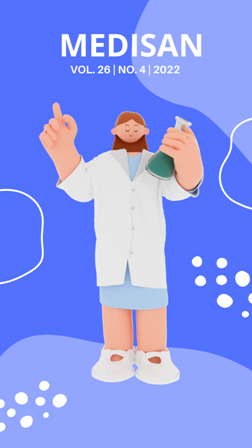Educative hyper-environment for learning the subject Methodology of the Investigation and the introduction to Inferencial Statistics for the nursing career
Keywords:
higher education, education in nursing, distance learning, computer programs, information technology, study programs.Abstract
An educative hyper-environment on the study program of the subjects Methodology of Investigation and Introduction to the Inferencial Statistics was implemented, which allowed to organize the access to updated information, and, with this, to improve the teaching-learning process. For this purpose, 10 professors and 57 students belonging to the fourth year of the nursing degree from the Health Technology-Nursing Faculty in Santiago de Cuba city were interviewed, likewise, the effectiveness level of the actions carried out with the students —under the guide of professors and tutors— aimed at improving the scientific and professional training, which was evidenced in the changes in attitude and motivation when evaluating the significance of the results, as well as in the increase in the number of participants in the scientific events and in the higher quality in the contents of the investigations. Teachers, tutors and students evaluated the hyper-environment as adequate and it was shown that its implementation may contribute to the teaching-learning process of the Methodology of Investigations and of the introduction to Inferencial Statistics.
Downloads
References
2. Prieto Díaz V, Quiñones La Rosa I, Ramírez Durán G, Fuentes Gil Z, Labrada Pavón T, Pérez Hechavarría O, et al. Impacto de las tecnologías de la información y las comunicaciones en la educación y nuevos paradigmas del enfoque educativo. Educ Med Super. 2011 [citado 26/05/2021];25(1):95-102. Disponible en: http://scielo.sld.cu/pdf/ems/v25n1/ems09111.pdf
3. Bueno Rodríguez JC. Impacto económico del uso secuencial de los antimicrobianos en los niños con apendicitis aguda complicada. Rev Arch Med Camagüey. 2015 [citado 26/05/2021];19(1):26-3. Disponible en: http://scielo.sld.cu/pdf/amc/v19n1/amc060114.pdf
4. Valdés Rojas MB, Hernández Mayea T, Alfonso Nazco M, Remedios González JM. La concepción e implementación de estrategias curriculares. Un reto a la calidad en la formación inicial. Gac Méd Espirit. 2017 [citado 26/05/2021];19(3). Disponible en: http://revgmespirituana.sld.cu/index.php/gme/article/view/1290/html
5. Núñez Jover J, González Pérez M, Torres Páez CC, Morales Calatayud M, Samoano Núñez V, Aguilera García LO, et al. Educación superior, gobierno y desarrollo local: avances prácticos y contribuciones académicas (2015-2019). Anales de la Academia de Ciencias de Cuba. 2021 [citado 22/07/2021];11(1). Disponible en: http://www.revistaccuba.cu/index.php/revacc/article/view/818
6. Ortiz García M, Vicedo Tomey A, Rodríguez Ribalta I, Sardiñas Arce ME. Propuesta de competencias profesionales genéricas para el perfil del egresado en la especialidad de Pediatría en Cuba. Rev Haban Cienc Méd. 2015 [citado 16/07/2021];14(6):814-22. Disponible en: http://scielo.sld.cu/pdf/rhcm/v14n6/rhcm11615.pdf
7. Ramos Vives M, Mena Lorenzo JA, Ferro González B, Márquez Márquez DR, Blanco Herrera IC. Fundamentos teóricos del proceso de formación pedagógica de los estudiantes de licenciatura en Enfermería. Rev Ciencias Médicas. 2020 [citado 21/07/2021];24(5):4614. Disponible en: http://www.revcmpinar.sld.cu/index.php/publicaciones/article/view/4614/pdf
8. Naranjo Hernández Y, Felipe Reyes T, Rodríguez Larreinaga M, Concepción Pacheco JA. Trabajo metodológico en los docentes de enfermería. AMC. 2017 [citado 20/05/2021];21(4):557-66. Disponible en: http://scielo.sld.cu/scielo.php?script=sci_arttext&pid=S1025-02552017000400015
9. Ceballos Ramos LM, Rodríguez Flores LA. Estrategia para el perfeccionamiento de la asignatura Elementos de Investigación Cualitativa en Salud. Rev Ciencias Médicas. 2020 [citado 24/05/2021];24(2):e4280. Disponible en: http://revcmpinar.sld.cu/index.php/publicaciones/article/view/4280
10. 8vo Congreso del PCC. Conceptualización del modelo y los Lineamientos para el periodo 2021-2026. La Habana: PCC; 2021.
11. Herrera Miranda GL, Horta Muñoz DM. Fundamentos teóricos del proceso de formación de habilidades investigativas en estudiantes de la carrera de Medicina. Rev Ciencias Médicas. 2012 [citado 24/05/2021];16(6). Disponible en: http://scielo.sld.cu/scielo.php?script=sci_arttext&pid=S1561-31942012000600011&lng=es
12. Piloto Meneses JO. Bases de datos, catálogos de videos didácticos y software educativos en la escuela cubana [citado 26/05/2021]. Disponible en: https://www.monografias.com/trabajos48/informatica-educativa/informatica-educativa2
13. Garay Cisneros VA. Análisis de una guía en exelearning en el proceso de enseñanza-aprendizaje de los estudiantes del instituto tecnológico superior tecno ecuatoriano Rev Cient UISRAEL. 2017 [citado 18/05/2021];4(3):59-75. Disponible en: https://revista.uisrael.edu.ec/index.php/rcui/article/view/84/80
14. Henao Bonilla A, González Salcedo LO. Elaboración de un ambiente virtual colaborativo usando eXeLearning para la enseñanza de Ciencias Naturales. Rev Ventana Inform. 2014 [citado 18/05/2021];31. Disponible en: https://revistasum.umanizales.edu.co/ojs/index.php/ventanainformatica/article/view/520/613
Published
How to Cite
Issue
Section
License
All the articles can be downloaded or read for free. The journal does not charge any amount of money to the authors for the reception, edition or the publication of the articles, making the whole process completely free. Medisan has no embargo period and it is published under the license of Creative Commons, International Non Commercial Recognition 4.0, which authorizes the copy, reproduction and the total or partial distribution of the articles in any format or platform, with the conditions of citing the source of information and not to be used for profitable purposes.





